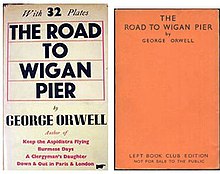 Left Book Club supplementary volume, with 32 pages of plates, left, and first Left Book Club edition, right | |
| Author | George Orwell |
|---|---|
| Language | English |
| Genre | Autobiography |
| Publisher | Victor Gollancz (London) |
Publication date | 8 March 1937 as a Left Book Club selection and a cloth-bound trade edition (Left Book Club supplementary volume, Part I, with 32 pages of plates, published May 1937[1]) |
| Publication place | United Kingdom |
| Media type | Print (hardback) |
| ISBN | 978-0-141-18529-3 |
| Preceded by | Keep the Aspidistra Flying |
| Followed by | Homage to Catalonia |
The Road to Wigan Pier is a book by the English writer George Orwell, first published in 1937. The first half of this work documents his sociological investigations of the bleak living conditions among the working class in Lancashire and Yorkshire in the industrial north of England before World War II. The second half is a long essay on his middle-class upbringing, and the development of his political conscience, questioning British attitudes towards socialism. Orwell states plainly that he himself is in favour of socialism, but feels it necessary to point out reasons why many people who would benefit from socialism, and should logically support it, are in practice likely to be strong opponents.
According to Orwell biographer Bernard Crick, publisher Victor Gollancz first tried to persuade Orwell's agent to allow the Left Book Club edition to consist solely of the descriptive first half of the book. When this was refused Gollancz wrote an introduction to the book. "Victor could not bear to reject it, even though his suggestion that the 'repugnant' second half should be omitted from the Club edition was turned down. On this occasion Victor, albeit nervously, did overrule Communist Party objections in favour of his publishing instinct. His compromise was to publish the book with [an introduction] full of good criticism, unfair criticism, and half-truths."[2]
The book grapples "with the social and historical reality of Depression suffering in the north of England, – Orwell does not wish merely to enumerate evils and injustices, but to break through what he regards as middle-class oblivion, – Orwell's corrective to such falsity comes first by immersion of his own body – a supreme measure of truth for Orwell – directly into the experience of misery."[3]
- ^ Orwell, Facing Unpleasant Facts, Secker & Warburg (new edition 2000), p. 12, ISBN 0-436-20538-6.
- ^ Edward, sRuth Dudley. Victor Gollancz, a Biography, pp. 246–247; quoted in A Kind of Compulsion: 1903–1936 (The Complete Works of George Orwell), p. 532.
- ^ Sabin, Margery (2007). "The truths of experience: Orwell’s nonfiction of the 1930s", in John Rodden (ed.), The Cambridge Companion to George Orwell, p. 45.